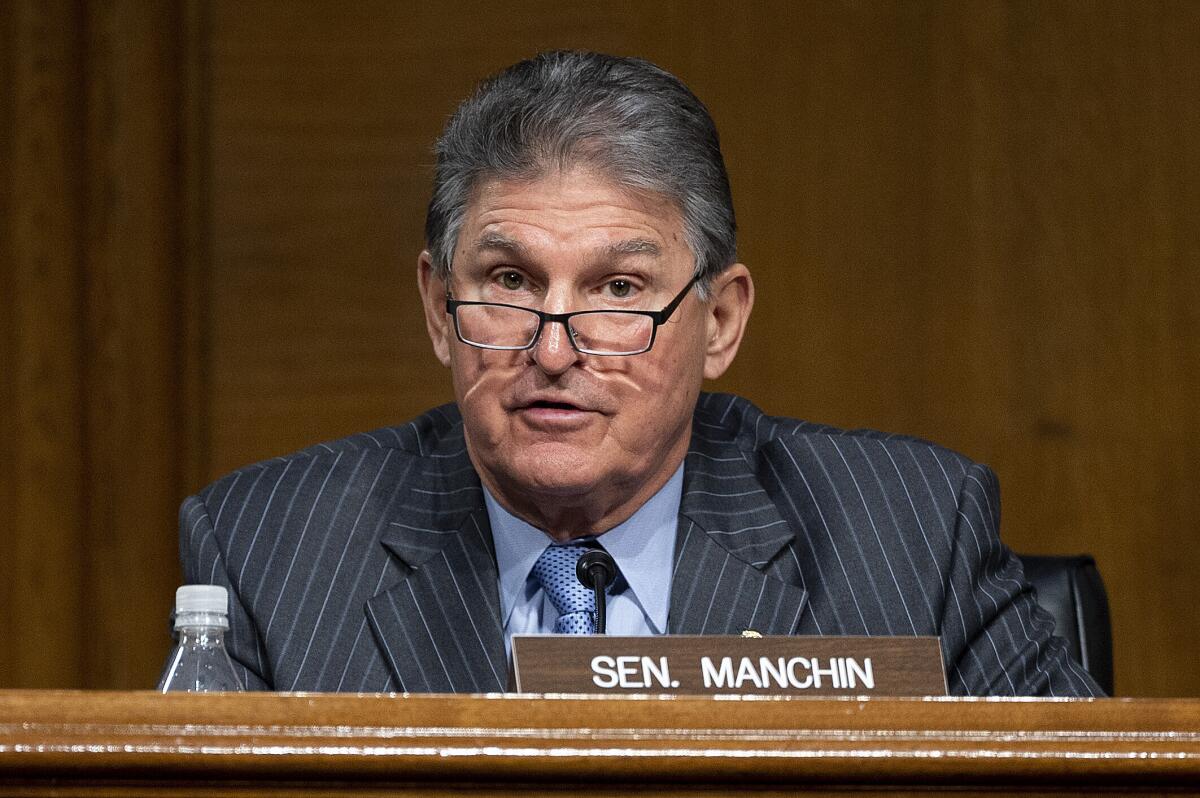Senate Republicans won’t even consider voting rights. The filibuster must go

- Share via
As expected, debate on a bill to protect voting rights was blocked in the U.S. Senate on Tuesday when the Democratic sponsors failed to garner 60 votes. But in reaching out to centrist Sen. Joe Manchin III (D-W.Va.), Senate Democrats indicated that they were open to compromise.
The shameful reaction of Senate Republicans, on the other hand, demonstrated that they are willing to ignore laws approved by GOP-controlled legislatures that make voting harder. Those measures reflect the lingering malign influence of Donald Trump’s Big Lie that the 2020 election was stolen.
Earlier on Tuesday, Senate Minority Leader Mitch McConnell (R-Ky.) said that Democrats were aiming to “tilt every election in America permanently in their favor.” That was an unfair, even outrageous, characterization of the Democrats’ proposal, the ambitious For the People Act, not to mention an exercise in projection.
The For the People Act in its Senate and House versions was arguably too large and complicated a piece of legislation, stitching together a multitude of proposals including disclosure requirement for political contributions, public financing of congressional elections and even an ethics code for the Supreme Court.
Its key provisions, however, rightly sought to enhance democracy and shore up the right to vote. The bill required states to offer 15 days of early voting, allow wide use of mail-in ballots and entrust congressional redistricting to independent commissions, as is done in California.
Manchin said this month that he couldn’t support the For the People Act. But last week he proposed a number of changes that should have attracted bipartisan support.
Some of Manchin’s ideas, such as a requirement for early voting, overlapped the provisions of the For the People Act. Others, such as his proposal for absentee ballots, were more restrictive. He also proposed making election day a holiday and, in a gesture to Republicans, requiring that voters supply identification (but not necessarily photo ID).
Manchin’s proposals were welcomed by Stacey Abrams, the former candidate for governor of Georgia and a voting rights activist, and by former President Obama. Majority Leader Charles E. Schumer’s willingness to have the Senate consider Manchin’s ideas led the West Virginia senator to join all 49 of his Democratic colleagues in voting to advance debate.
Republicans weren’t willing even to debate the bill, or offer amendments.
In addition to accusing Democrats of a power play, Republicans have claimed that Democratic election bills are an attempt to “federalize” elections. But the Constitution expressly allows Congress to override state decisions about the “times, places and manner” of congressional elections. Congress also can enact legislation to ensure that presidential elections aren’t marred by corruption or racial discrimination.
After Tuesday’s vote, Schumer said that it represented “the starting gun, not the finish line.” Manchin and another Democratic senator, Kyrsten Sinema of Arizona, have resisted the idea of abolishing the filibuster. But if GOP senators continue to stonewall reasonable legislation to protect the right to vote, those two reluctant Democrats must be pressed to recognize that — at least where protecting democracy is concerned — the filibuster must go.
More to Read
A cure for the common opinion
Get thought-provoking perspectives with our weekly newsletter.
You may occasionally receive promotional content from the Los Angeles Times.









